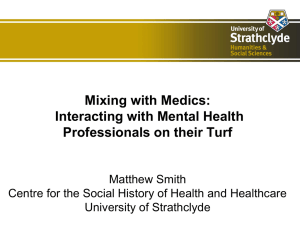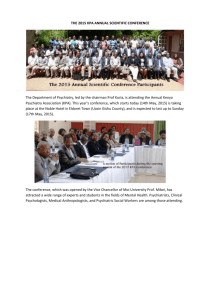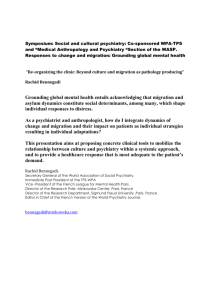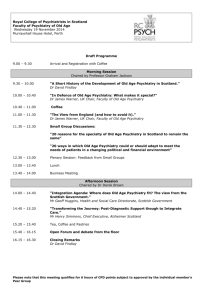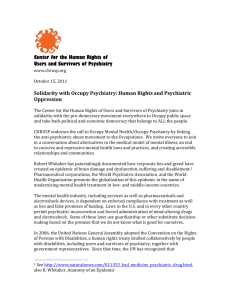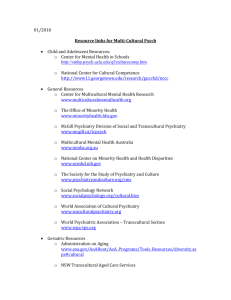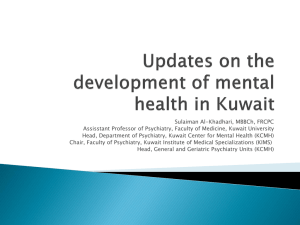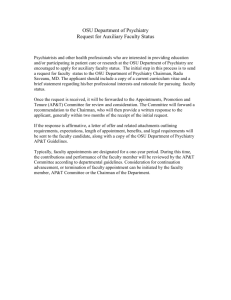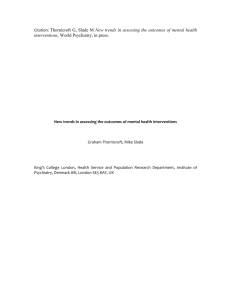Subject and problems of psychiatry
advertisement
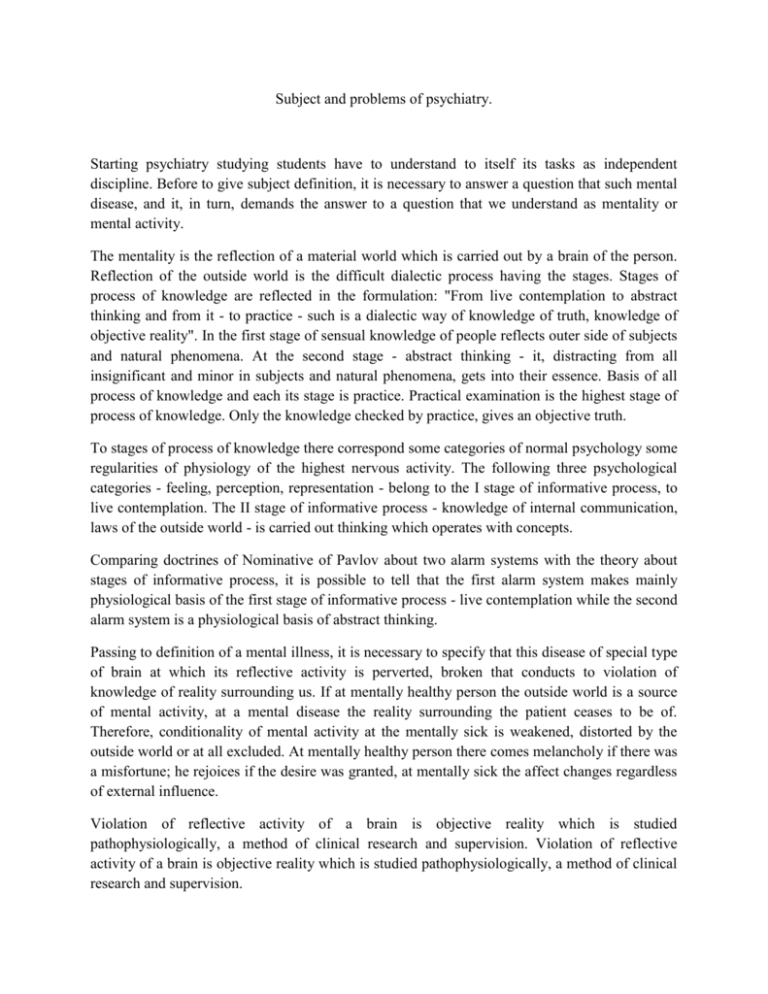
Subject and problems of psychiatry. Starting psychiatry studying students have to understand to itself its tasks as independent discipline. Before to give subject definition, it is necessary to answer a question that such mental disease, and it, in turn, demands the answer to a question that we understand as mentality or mental activity. The mentality is the reflection of a material world which is carried out by a brain of the person. Reflection of the outside world is the difficult dialectic process having the stages. Stages of process of knowledge are reflected in the formulation: "From live contemplation to abstract thinking and from it - to practice - such is a dialectic way of knowledge of truth, knowledge of objective reality". In the first stage of sensual knowledge of people reflects outer side of subjects and natural phenomena. At the second stage - abstract thinking - it, distracting from all insignificant and minor in subjects and natural phenomena, gets into their essence. Basis of all process of knowledge and each its stage is practice. Practical examination is the highest stage of process of knowledge. Only the knowledge checked by practice, gives an objective truth. To stages of process of knowledge there correspond some categories of normal psychology some regularities of physiology of the highest nervous activity. The following three psychological categories - feeling, perception, representation - belong to the I stage of informative process, to live contemplation. The II stage of informative process - knowledge of internal communication, laws of the outside world - is carried out thinking which operates with concepts. Comparing doctrines of Nominative of Pavlov about two alarm systems with the theory about stages of informative process, it is possible to tell that the first alarm system makes mainly physiological basis of the first stage of informative process - live contemplation while the second alarm system is a physiological basis of abstract thinking. Passing to definition of a mental illness, it is necessary to specify that this disease of special type of brain at which its reflective activity is perverted, broken that conducts to violation of knowledge of reality surrounding us. If at mentally healthy person the outside world is a source of mental activity, at a mental disease the reality surrounding the patient ceases to be of. Therefore, conditionality of mental activity at the mentally sick is weakened, distorted by the outside world or at all excluded. At mentally healthy person there comes melancholy if there was a misfortune; he rejoices if the desire was granted, at mentally sick the affect changes regardless of external influence. Violation of reflective activity of a brain is objective reality which is studied pathophysiologically, a method of clinical research and supervision. Violation of reflective activity of a brain is objective reality which is studied pathophysiologically, a method of clinical research and supervision. Reflection of surrounding objective reality not at all mental diseases is broken equally. At early stages of a current of certain forms of mental diseases initial violation of sensual knowledge still is critically estimated by the patient and only later, after further complication of clinical symptomatology of an illness contacts the general defeat of abstract thinking and the personality as a whole. At some mental diseases the sensual knowledge, i.e. direct reflection of subjects and the phenomena, is broken slightly, and the most difficult forms of thinking - abstract, rational knowledge, reflection of internal communications of things and the phenomena is broken in a bigger measure. Material substratum of mentality is the brain. However endocrine glands with humoral and chemical regulation and vegetative nervous system have huge impact on mental activity of the person. Psychiatry ("loony" - soul, "иатреиа" - treatment) - science about manifestations, an etiology and патогенезе mental diseases, their prevention, treatment, the help organization. Psychiatry development historically developed so that the area of its research wasn't limited to psychoses, extended and on neurosises, and also the mental changes coming at somatic diseases. The psychiatry is part of medicine, medical discipline. In turn it is divided into the general psychiatry studying main, general for much of mental diseases of regularity of manifestation and development of disorders of mental activity, questions of an etiology and патогенеза, the nature of typical psychopathological processes, their reasons, the principles of classification, a restoration problem, research methods, and the private psychiatry investigating separate mental diseases. As a result of expansion of field of activity of psychiatry its separate branches were formed: the children's psychiatry studying mental diseases at children; the military psychiatry investigating features of mental diseases, arising in armies, their prevention and treatment, and also questions of military and psychiatric examination; the judicial psychiatry developing problems of forensic-psychiatric examination, psychiatric criteria of diminished responsibility and incapacity, legal status of mental patients; the psychiatric labor examination dealing with issues of working capacity at mental diseases, problems of labor compensation, social adaptation, employment of disabled people; the organizational psychiatry developing methods and forms prevention of mental diseases and psychiatric help; epidemiology of mental diseases, i.e. research of their prevalence among the population and the factors influencing their distribution; psychohygiene which is engaged in studying of questions of strengthening of mental health of the population and the prevention of mental diseases. The pathophysiology, biochemistry, biophysics, immunology, electrophysiology, pathological anatomy and histopathology of mental diseases, psychopharmacology become specialized sections of psychiatry. Psychiatry, being independent clinical discipline, at the same time it is inseparable from all other sections of medicine. At any illness all organism, and, therefore, to some extent and mentality suffers. Therefore regardless of nature of specialty each doctor, distinguishing any illness, features of its development and a current at the certain patient, always are investigated also by his mental condition (consciousness, mood, behavior, the relation to the illness). Any therapy, including and surgical intervention, it is inseparably linked with influence on mentality with what also the doctor of any specialty always is considered. In usual practical activities initial recognition of a mental disease or suspicion about it arise more often for the first time not at the psychiatrist, and at the doctor of other specialty, mainly at the therapist to whom patients first of all, regardless of character of an illness address. On a row with it it is necessary to emphasize and that circumstance that considerable number of mental diseases in one cases at an initial stage, in others - throughout proceed it is erased, with existence of the expressed somatic and neurotic frustration at the minimum expressiveness of the mental. It also imposes responsibility for early diagnostics of a mental illness on all doctors, after all the further destiny of patients in many respects depends on it.
